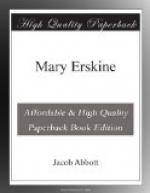The law invests every man with a very absolute power in respect to his property, authorizing him to make any disposition of it whatever, and carrying faithfully into effect, after his death, any wish that he may have expressed in regard to it, as his deliberate and final intention. It insists, however, that there should be evidence that the wish, so expressed, is really a deliberate and final act. It is not enough that the man should say in words what his wishes are. The will must be in writing, and it must be signed; or if the sick man can not write, he must make some mark with the pen, at the bottom of the paper, to stand instead of a signature, and to show that he considers the act, which he is performing, as a solemn and binding transaction. Nor will it do to have the will executed in the presence of only one witness; for if that were allowed, designing persons would sometimes persuade a sick man, who was rich, to sign a will which they themselves had written, telling him, perhaps, that it was only a receipt, or some other unimportant paper, and thus inducing him to convey his property in a way that he did not intend. The truth is, that there is necessity for a much greater degree of precautionary form, in the execution of a will, than in almost any other transaction; for as the man himself will be dead and gone when the time comes for carrying the will into effect,—and so can not give any explanation of his designs, it is necessary to make them absolutely clear and certain, independently of him. It was, accordingly, the law, in the state where Mary Erskine lived, that there should be three witnesses present, when any person signed a will; and also that when signing the paper, the man should say that he knew that it was his will. If three credible persons thus attested the reality and honesty of the transaction, it was thought sufficient, in all ordinary cases, to make it sure.
Albert, it seems, was not aware how many witnesses were required. When he requested Mrs. Bell to sign his will, as witness, he thought that he was doing all that was necessary to make it valid. When, however, Mrs. Bell, afterwards, in going home, met Mr. Keep and related to him the transaction, he said that he was afraid that the will was not good, meaning that it would not stand in law.
The thought that the will was probably not valid, caused Mrs. Bell a considerable degree of anxiety and concern, as she imagined that its failure would probably cause Mary Erskine a considerable degree of trouble and embarrassment, though she did not know precisely how. She supposed that the children’s share of the property must necessarily be kept separate and untouched until they grew up, and that in the mean time their mother would have to work very hard in order to maintain herself and them too. But this is not the law. The guardian of children, in such cases, is authorized to expend, from the children’s share of property, as much as is necessary for their




